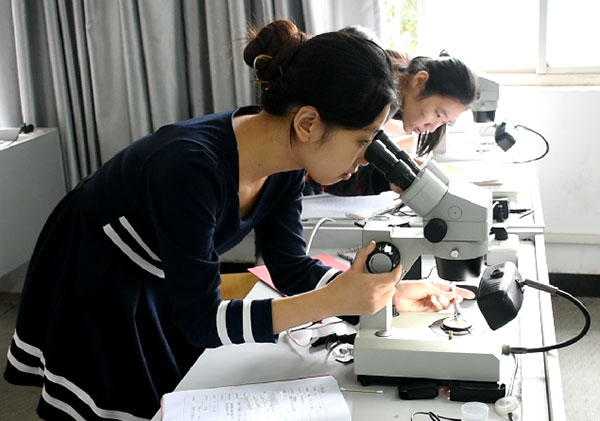 |
|
A student uses a microscope to observe a diamond during a gem identification class at Wuhan University of Engineering Science in Hubei province in September. YE SHUN/CHINA DAILY |
Educators divided on whether life skills such as cooking should be taught at the university level
The start of a new semester often sees the introduction of new courses at universities. Some might be called rare - or even strange - and educators are divided on whether it is necessary to offer such classes at serious institutions of higher education.
In September, a course called "The Theory and Practice of Romantic Relationships" was offered at Tianjin University, attracting some attention. Offered by a student society at the university, the course was conducted in the form of group discussion of various related books.
The course, which earns two credits, also contained practical training on how to get along with peers of the opposite sex.
"Students will get high scores if they are fully engaged in the course, acquire the skills with their hearts and try to put what they learned into practice," said Cong Ying, head of the student society.
Gu Jun, a sociology professor at Shanghai University, said students do need guidance on how to start and maintain romantic relationships. But he doubted a course on the subject was needed.
"University students have many and diversified needs. Should universities open courses to meet every need, especially when teaching resources are limited at a university?" Gu asked.
Some needs can be met through activities organized by student groups, he said. "Besides, universities should be serious and careful in approving courses. Are student societies qualified to teach? I really doubt it."
But the love course at Tianjin University is not an isolated case. A number of unusual courses have popped up at Chinese universities in recent years. The swanky gem identification course at Wuhan University of Engineering Science is another example.
The university recently spent more than 500,000 yuan ($80,000) buying more than 130 gems, intending to instruct students on how to identify precious gems. The idea was criticized by some netizens as "too luxurious".
But Cai Yanhou, a higher education researcher at Central South University in Changsha, Hunan province, praised universities' initiative in opening such courses.
"As higher education - previously a privilege of very few - becomes popularized in China, more and more Chinese universities have begun to realize that they are no longer places where only obscure knowledge is taught," Cai said. "They should also help students master skills and abilities needed in daily life, to ensure that they can solve practical problems and adapt well to social life after graduation."
He added that universities can teach the skills and abilities by offering elective courses, rather than compulsory ones, to cover more students and make full use of teaching resources.
"Such practices are mature and successful at many universities overseas, and people can see more 'rare and strange' courses there," he said.
Chu Zhaohui, a senior researcher at the National Institute of Education Sciences, agreed.
"At present, Chinese universities should have the freedom and should be encouraged to open more elective courses, because they have long been short of such courses and have been unable to meet students' needs for developing in an all-around way," Chu said, adding that both the love and the gem courses are good attempts.
"After the courses are set up, let the university academic committee supervise and inspect them to ensure quality, and let the students decide whether these courses should last a long time or only one or two semesters," Chu said.
zhaoxinying@chinadaily.com.cn
